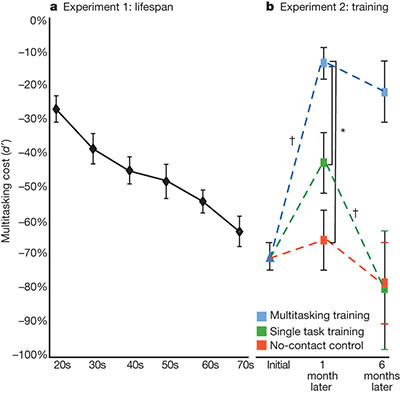Video games are good for you… and your grandparents!
Subject areas: Neuroscience
Vocabulary:
adaptive staircase training – a standard method for determining maximum ability. In short, the subject is tested at an easy level, and if she succeeds, tested at higher level. This continues until the subject fails, then she is tested at the level one step easier and attempts to go up a level again. Often, she will succeed, and move up a level, but then fail again soon after. Eventually performance levels out, thus determining maximum ability on this particular test.
electroencephalography (EEG) – a way to measure brain activity by the use of electrical sensors contacting the skin surrounding the brain. This may be a web of sensors that may or may not be adhered to the scalp. Sometimes done wearing a tight skullcap fitted with many electrodes, each of which senses changes in electrical activity in the part of the brain close to it. This is a relatively crude method, since each electrode likely reads the approximate average activity of thousands of neurons, not individual cells, but is the most efficient and cost-effective method to measure brain activity.
The article: Anguera, J.A. et al, Nature 501, 97–101 doi:10.1038/nature12486
This article should be a fun one, especially for your students if you are a HS teacher. It is about video games, multitasking, and the possibility of slowing age-related mental decline. Today, most teens are familiar with video and computer games, even if they don’t play them regularly, and of course multitasking is frequently in the news because of the “Don’t Text and Drive” campaigns.
The research is based primarily on use of Neuroracer, a computer video game with two basic components. First, the majority of the screen is a vertically scrolling road that twists and turns, on which there is an automobile. The test subject steers the automobile with a controller using the left thumb. Meanwhile, at random intervals, a small sign/window will pop up on the screen bearing different shapes and colors. If the sign is of a particular shape and color, the subject is instructed to “shoot” it down using a trigger controller in the right hand. The graphics are rudimentary, as you can see below, without scenery or anything else to distract the player.
The first part of the project was to assess the ability of test subjects to play the game. The subjects were divided by age into decades, with about 30 individuals in each group, representing the 20’s, 30’s, 40’s, 50’s, 60’s, and 70’s. Keeping in mind that what they wanted to measure was the effect that multitasking had on performance, they first tested each subject on their ability to do either the driving or the sign recognition parts of the game individually. Once they knew that, they could set the difficulty level of the combined game for each tester. This is important, because what the researchers care about is not how well a person can play the game in an absolute sense. They care about how much difference in makes when the player’s brain has to pay attention to two different tasks instead of just one.
It probably comes as no surprise that there is an inverse relationship between age and ability on both the driving task and the sign recognition task individually. There is also an inverse relationship between age and ability on the combined task. What is new information is that there is a clear inverse relationship between age and the cost (in terms of mental ability) of multitasking (left side of the figure below). That is, older people have a more difficult time multitasking than younger people. That sounds intuitively true, but it has not been shown as convincingly before.
The cool thing is that older people can fight that decline somewhat. Look at the right side of the figure above. The orange is the performance of a group of older (in their 60’s and 70’s) people who did not get extra training. In green is the performance of a group of older people who were trained on both driving and sign recognition tasks individually, but not together. You can see quite an improvement after a month of training, but five months after finishing the training, their performance has fallen to approximately baseline levels. Now look at the blue line. These are older subjects who received extra training on the complete multitasking game. Not only do they perform much better than those with individual task training, that benefit persists for much longer!
Some of you may be thinking, well, a bunch of manufacturers of games from Nintendo’s Brain Age series to Lumosity’s Brain Games have been claiming that their games improve brain function for years. That is true, but they didn’t actually have good, well-documented well-designed science to back that up. Interestingly, the researchers comment that older studies on multitasking that did not show a strong long-term benefit use “sparse environments” for testing instead of a “immersive and fun video game”.
Others of you may be thinking, who cares if you can get better at playing a game? Do anything long enough and you’ll probably get better at it, right? The authors of this paper probably anticipated your skepticism, and also tested their players on tasks that had nothing to do with the game. They ran a battery of standard cognitive tests, and found that the multitasking-trained group did significantly better in tests of working memory and sustained attention.
Finally, using electroencephalography to monitor brain activity, they found a physiological correlate to the multitasking training. There was a significant increase in the “frontal theta power”, which refers to electrical activity of a certain frequency in the frontal lobe of the brain.
Pretty neat stuff, and nicely designed science.




No comments
Be the first one to leave a comment.